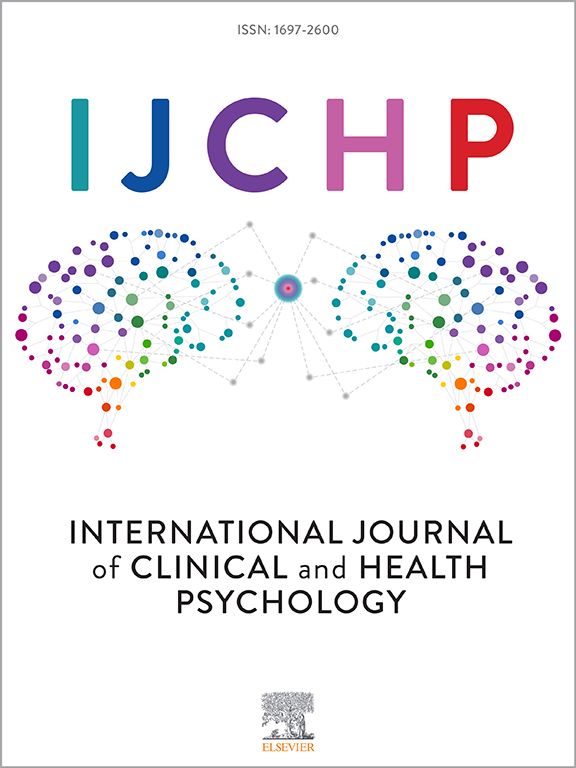Neural and behavioral dynamics of error processing under chronic stress in healthy young adults
IF 4.4
1区 心理学
Q1 PSYCHOLOGY, CLINICAL
International Journal of Clinical and Health Psychology
Pub Date : 2025-01-01
DOI:10.1016/j.ijchp.2025.100561
引用次数: 0
Abstract
Chronic stress has a negative impact on cognitive function and physical health, particularly impairing cognitive control function. This study aimed to investigate the effects of chronic stress on error processing, specifically error monitoring and post-error adjustment. We assessed 61 healthy college students (32 females, 29 males, age: 18.80 ± 0.68 years) using the Student-Life Stress Inventory (SLSI) and a four-choice Flanker task with response-stimulus intervals (RSIs) of 200 ms, 700 ms, and 1500 ms to investigate the temporal dynamics of error monitoring and characteristics of different phases of post-error processing under chronic stress. Results revealed that higher chronic stress levels were associated with smaller post-error slowing (PES) and larger post-error accuracy decrease (PEAD). Dividing participants into high-chronic stress (n = 30) and low-chronic stress (n = 31) groups, we found that the ΔPe amplitude at 200 ms RSI in the low-stress group was significantly larger than that in the high-stress group, indicating that chronic stress impairs the recognition of error responses. At 200 ms RSI, the PEAD in the high-stress group was significantly larger than in the low-stress group. This suggests that high levels of chronic stress impair early-stage post-error adjustment processing. The study highlights that chronic stress impairs error monitoring and early post-error processing, revealing features of continuous processing stages in behavioral monitoring under chronic stress.
健康青年慢性应激下错误加工的神经和行为动力学
慢性压力对认知功能和身体健康有负面影响,特别是损害认知控制功能。本研究旨在探讨慢性应激对错误加工,特别是错误监测和错误后调整的影响。采用学生生活压力量表(SLSI)和四选项Flanker任务(RSIs分别为200 ms、700 ms和1500 ms)对61名健康大学生(女性32名,男性29名,年龄18.80±0.68岁)进行测试,探讨慢性应激条件下错误监测的时间动态和不同阶段错误后加工的特征。结果显示,较高的慢性应激水平与较小的误差后减慢(PES)和较大的误差后精度下降(PEAD)相关。我们将被试分为高慢性应激组(n = 30)和低慢性应激组(n = 31),发现低应激组在200 ms RSI时的ΔPe振幅显著大于高应激组,表明慢性应激损害了错误反应的识别。在200 ms RSI时,高应激组的PEAD明显大于低应激组。这表明高水平的慢性应激损害了早期的误差后调整加工。本研究强调慢性应激对错误监测和错误后早期加工的影响,揭示了慢性应激下行为监测的连续加工阶段特征。
本文章由计算机程序翻译,如有差异,请以英文原文为准。
求助全文
约1分钟内获得全文
求助全文
来源期刊

International Journal of Clinical and Health Psychology
PSYCHOLOGY, CLINICAL-
CiteScore
10.70
自引率
5.70%
发文量
38
审稿时长
33 days
期刊介绍:
The International Journal of Clinical and Health Psychology is dedicated to publishing manuscripts with a strong emphasis on both basic and applied research, encompassing experimental, clinical, and theoretical contributions that advance the fields of Clinical and Health Psychology. With a focus on four core domains—clinical psychology and psychotherapy, psychopathology, health psychology, and clinical neurosciences—the IJCHP seeks to provide a comprehensive platform for scholarly discourse and innovation. The journal accepts Original Articles (empirical studies) and Review Articles. Manuscripts submitted to IJCHP should be original and not previously published or under consideration elsewhere. All signing authors must unanimously agree on the submitted version of the manuscript. By submitting their work, authors agree to transfer their copyrights to the Journal for the duration of the editorial process.
 求助内容:
求助内容: 应助结果提醒方式:
应助结果提醒方式:


